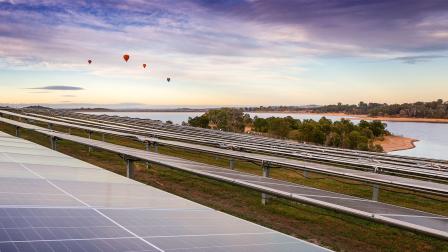We invited the public to join our contest for innovative ways to reduce or eliminate Scope 1 greenhouse gas emissions (methane and nitrous oxide) from our wastewater treatment plants. Read the case study to learn more.
Sustainable Development Goals:
Goal 13: Climate action
Background
Although Melbourne Water has made a substantial reduction in its Scope 2 (indirect) greenhouse gas emissions, reducing Scope 1 (direct) greenhouse emissions has proven more challenging.
Both the Western Treatment Plant and Eastern Treatment Plant produce a high volume of Scope 1 emissions. We are committed to reducing these in line with the State Government’s target of zero emissions by 2030, as well as the United Nations Sustainable Development Goal 13 – Climate Action.
Project focus
To tackle this problem, we launched the Scope 1 Emissions Innovation Competition, a highly competitive global contest aimed as identifying new solutions. We engaged Isle Utilities to manage the competition and offered a $10,000 prize to each of the top four participants to develop their ideas further.
These were then presented to an expert committee who selected the winning entry, with the winner receiving $160,000 to carry out a feasibility study.
Outcomes
From a quality field of proposals, the Cranfield University/AECOM/Royal Melbourne Institute of Technology University group was assessed as the best overall detailed solution, offering potential for both a high degree of reduction in direct emissions and also improving energy efficiency, relative to conventional treatment processes.
Their winning solution, which is being described as a new paradigm in wastewater treatment, combines established unit operations and mature technologies with newer elements in a way that reduces dependency on biological processes more prone to greenhouse gas emissions. Reductions in greenhouse gas emissions of up to 90 per cent are considered feasible.
Liveability Victoria co-funded the prize, which will be used to further develop and test key elements of the proposal at laboratory scale. This is expected to take around eight months. Beyond this, further design and pilot scale testing work would be required to assess potential feasibility for larger scale implementation.
More information: competition details
In October 2018 we invited the public to join our contest for innovative ways to reduce or eliminate Scope 1 greenhouse gas emissions (methane and nitrous oxide) from our wastewater treatment plants.
This competition gave people the opportunity to submit their ideas to work with Melbourne Water on reducing emissions and share in a funding pool totaling $200,000 AUD if their idea was selected.
Individuals, institutions and corporations based in Australia and overseas were eligible to apply. Submissions could be based on early stage concepts or ideas through to established technologies and process solutions.
Types of submissions
Ideas were welcome in:
-
Emissions measurement and modelling, for example:
-
atmospheric measurement of emissions from the treatment plants
-
measurement of dissolved methane and nitrous oxide in wastewater
-
process computer modelling and identifying key influences on emissions.
-
-
Optimisation of existing wastewater treatment processes, for example:
-
process covers, emission capture and treatment
-
real-time control system for process optimisation to minimise emissions
-
alternative process configurations
-
side-stream nutrient removal that result in emission reduction.
-
-
Wastewater treatment processes of the future, for example:
-
decoupling nitrogen removal from aerobic processes
-
algae processes
-
decentralised treatment
-
anaerobic processes.
-
Evaluation criteria
We evaluated submissions on:
- being conceptually and technically sound
- the solution’s effectiveness in measuring, capturing and/or reducing Scope 1 emissions
- the solution’s relevance and ease of integration into the existing infrastructure and/or operations of Melbourne Water’s Eastern and Western Treatment Plants
- any added value provided by the proposed solution
- the financial viability of the proposed solution
- the entrant’s track record and/or experience
Shortlisted applicants
The Competition Jury selected the top four ideas and were awarded funding ($10,000 AUD each) to produce a detailed solution. The shortlisted submissions were:
- Cranfield University who proposed an alternative treatment paradigm based on abiotic processes and anaerobic treatment which eliminate the production of scope 1 emissions.
- HydroTerra who proposed the deployment of a novel, integrated above and below surface gas monitoring system to quantify scope 1 emissions.
- WSP, who proposed eliminating scope 1 emissions from the drying pans and the sludge stockpiles utilising gasification.
- Calibre who proposed a thermal ammonia stripper with ammonia oxidizer that will eliminate most of the sludge digestion related scope 1 emissions.
General Manager Integrated Planning Chris Williams said the quality and diversity of the submissions were very impressive.
“The entrants embraced the challenge of being as creative as possible in their solutions. We are excited to now move in to the detailed solution formulation stage with the four successful entrants, and to be one step closer to making real reductions in fugitive greenhouse emissions.”
Competition winner
The Cranfield University/AECOM/RMIT group was assessed as the best overall detailed solution in the Scope 1 Emissions Innovations Competition. They were awarded $150,000 AUD to undertake scopes of work as defined in their Detailed Solutions and in consultation with Melbourne Water.
The group's pitch offers potential for both a high degree of reduction in direct emissions and improving energy efficiency, relative to conventional treatment processes. It included some established unit operations and mature technologies and combined these with newer elements in a way that reduces dependency on biological processes that are more prone to greenhouse gas emissions.
Technical Director, AECOM Peter Hillis said the group was excited to be moving to the next phase of work. The competition prize was co-funded by Liveability Victoria and will be used to further develop and test key elements of the proposal at laboratory scale.
Downloads
You may also like...
Our Path to Net Zero
We’re taking action on climate change, pledging to halve our emissions by 2025 and reduce them to net zero by 2030.

Delivering on the Sustainable Development Goals
This report outlines Melbourne Water's unwavering commitment to advancing sustainability through the United Nations Sustainable Development Goals (SDGs).
